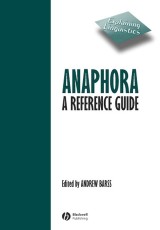Details

Anaphora
A Reference GuideExplaining Linguistics, Band 3 1. Aufl.
|
56,99 € |
|
| Verlag: | Wiley-Blackwell |
| Format: | |
| Veröffentl.: | 15.04.2008 |
| ISBN/EAN: | 9780470754627 |
| Sprache: | englisch |
| Anzahl Seiten: | 304 |
DRM-geschütztes eBook, Sie benötigen z.B. Adobe Digital Editions und eine Adobe ID zum Lesen.
Beschreibungen
<p><i>Anaphora: A Reference Guide</i> is a collection of essays that report on the major results of recent research in anaphora and set the stage for further inquiry.</p> <ul> <li>Reports on the major results of recent research in anaphora and sets the stage for further inquiry.</li> <li>Features contributions from among the world's leading researchers on anaphora.</li> <li>Presents an exciting picture of how broad the phenomenon of anaphora is and how it can reveal many mysterious properties of language.</li> <li>Includes articles of interest to many disciplines, including philosophy of language, philosophy of mind, cognitive science, linguistics, language studies, cognitive psychology, and psycholinguistics.</li> </ul>
Notes on Contributors. <p>Preface.</p> <p>Acknowledgments.</p> <p>1. Timing Puzzles in Anaphora and Interpretation (Andrew Barss).</p> <p>2. Two Types o0f Scrambling Constructions in Japanese (Ayumi Ueyama).</p> <p>3. The Psycholinguistics of Anaphora (Janet L. Nicol and David A. Swinney).</p> <p>4. Two Pronominal Mysteries in the Acquisition of Binding and Control (Dana McDaniel).</p> <p>5. Reference Transfers and the Giorgione Problem (Mario Montalbetti).</p> <p>6. Tense and Anaphora: Is There a Tense-Specific Theory of Coreference (Karen Zagona).</p> <p>7. Surface and Deep Anaphora, Sloppy Identity, and Experiments in Syntax (Hajime Hoji).</p> <p>8. The Logic of Reflexivity and Reciprocity (D. Terence Langendoen and Joel Magloire).</p> <p>References.</p> <p>Index.</p>
‘Andrew Barss's Anaphora is a dynamic contribution, full of interesting and insightful essays. I recommend it in the highest possible terms.’ <i>David Lebeaux, NEC Research</i> <i>Institute</i> <!--end--> <br /> <p>‘This is an outstanding book. Relating linguistics to other cognitive domains in a non-trivial way, it clearly addresses an impressive number of issues important for our understanding of the design and nature of language.’ <i>Pierre Pica, Centre National de la Recherche Scientifique, Paris, France</i><br /> </p> <p>"Andrew Narss has done Linguistics and its related fields a good service by putting together a collection of papers that address a number of important issues in the study of anaphora. The major selling point of the book under considersation is two fold. First the articles contained in the volume are of high quality ... Secondly, the book represents a welcome attempt to relate linguistics to cognitive science, thus helping to shed new light on our quest to attain a better understanding of human cognition ... the book deserves to be read by anyone who is seriously interested in the study of anaphora." <i>Linguistics, volume 42 2006, Cambridge University Press</i></p>
<b>Andrew Barss</b> is Associate Professor of Linguistics and Associate Research Social Scientist in Cognitive Science at the University of Arizona. His research interests include anaphora, movement phenomena, and scope; the syntax of logical form; derivational models of syntax and their relation to performance models; and competition-based models of syntactic form and the constraints they impose on semantic interpretation.
Anaphora is the study of referential relationships in language. Given the great flowering of the study of this topic in the last decade, it is time for a book that reports on the major results of recent research and sets the stage for further inquiry. <br /> <p><br /> </p> <p>The authors represented in <i>Anaphora: A Reference Guide</i> are among the world's leading researchers on anaphora and are ideally suited to meet this goal. Their work draws on theoretical principles and methodologies in linguistics, cognitive psychology, and philosophy, as well as the integrated, broad perspective of cognitive science.<br /> </p> <p>These stimulating reports of cutting-edge research will be useful to both undergraduate and graduate students and will find a large audience among professional researchers of anaphora and scholars who want to catch up on what is new and exciting in the area.</p>
‘Andrew Barss's Anaphora is a dynamic contribution, full of interesting and insightful essays. I recommend it in the highest possible terms.’ <i>David Lebeaux, NEC Research</i> <i>Institute</i> <!--end--> <br /> <p>‘This is an outstanding book. Relating linguistics to other cognitive domains in a non-trivial way, it clearly addresses an impressive number of issues important for our understanding of the design and nature of language.’ <i>Pierre Pica, Centre National de la Recherche Scientifique, Paris, France</i><br /> </p> <p>"Andrew Narss has done Linguistics and its related fields a good service by putting together a collection of papers that address a number of important issues in the study of anaphora. The major selling point of the book under considersation is two fold. First the articles contained in the volume are of high quality ... Secondly, the book represents a welcome attempt to relate linguistics to cognitive science, thus helping to shed new light on our quest to attain a better understanding of human cognition ... the book deserves to be read by anyone who is seriously interested in the study of anaphora." <i>Linguistics, volume 42 2006, Cambridge University Press</i></p>
Diese Produkte könnten Sie auch interessieren:

The Handbook of Hispanic Linguistics

von: José Ignacio Hualde, Antxon Olarrea, Erin O'Rourke

46,99 €

A Companion to Lesbian, Gay, Bisexual, Transgender, and Queer Studies

von: George E. Haggerty, Molly McGarry

38,99 €














